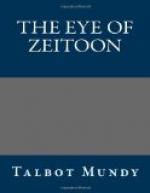“Don’t the Armenians know what’s in store for them?” I asked.
“Some of them know. Some guess. Some are like the villagers on Mount Vesuvius—much as we English were in ’57 in India, I imagine —asleep—playing games—getting rich on top of a volcano. The difference is that the Armenians will have no chance.”
“Did you ever hear tell of the Eye of Zeitoon?” asked Will, apropos apparently of nothing.
“No,” said the consul, staring at him.
Will told him of the individual we had talked with in the khan the night before, describing him rather carefully, not forgetting the gipsies in the black tent, and particularly not the daughter of the dawn who schooled a gray stallion in the courtyard.
The consul shook his head.
“Never saw or heard of any of them.”
We were sitting in full view of the roadstead where Anthony and Cleopatra’s ships had moored a hundred times. The consul’s garden sloped in front of us, and most of the flowers that Europe reckons rare were getting ready to bloom.
“Would you know the man if you saw him again, Will?” I asked.
“Sure I would!”
“Then look!”
I pointed, and seeing himself observed a man stepped out of the shadow of some oleanders. There was something suggestive in his choice of lurking place, for every part of the oleander plant is dangerously poisonous; it was as if he had hidden himself among the hairs of death.
“Him, sure enough!” said Will.
The man came forward uninvited.
“How did you get into the grounds?” the consul demanded, and the man laughed, laying an unafraid hand on the veranda rail.
“My teskere is a better than the Turks give!” he answered in English. (A teskere is the official permit to travel into the interior.)
“What do you mean?”
“How did sunshine come into the garden? By whose leave came the wind?”
He stood on no formality. Before one of us could interfere (for he might have been plying the assassin’s trade) he had vaulted the veranda rail and stood in front of us. As he jumped I heard the rattle of loose cartridges, and the thump of a hidden pistol against the woodwork. I could see the hilt of a dagger, too, just emerging from concealment through the opening in his smock. But he stood in front of us almost meekly, waiting to be spoken to.
“You are without shame!” said the consul.
“Truly! Of what should I be ashamed!”
“What brought you here?”
“Two feet and a great good will! You know me.”
The consul shook his head.
“Who sold the horse to the German from Bitlis?”
“Are you that man?”
“Who clipped the wings of a kite, and sold it for ten pounds to a fool for an eagle from Ararat?”
The consul laughed.
“Are you the rascal who did that?”
“Who threw Olim Pasha into the river, and pushed him in and in again for more than an hour with a fishing pole—and then threw in the gendarmes who ran to arrest him—and only ran when the Eenglis consul came?”




